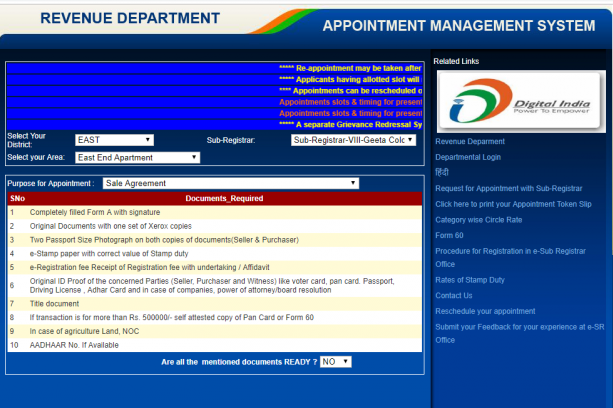Overview of Sale Deed Registration
Sale deed evidences the sale and transfer of ownership of a property, which is a legal contract executed by the seller & the purchaser. A sale deed is an essential Document for both the parties which are registered in accordance with the Registration Act, 1908. It is signed as mentioned in the agreement after both the parties agree with the terms & conditions.
You have to be sure of relevant details while purchasing immovable property, like decided price, any dues associated with it, the total area of the property, the transfer of ownership, etc. You need to know the process of sale deed, the necessary elements, and even the sale deed format for this process’s proper execution.
What are the Meanings of Terms in a Sale Deed?
Seller/Transferor
Seller is the one who is keen or willing to sell his property for a price that has current ownership of the property to be sold.
Witness
The person who signs on the sales deed admitting to the fact that the buyer and seller have signed the sale deed is known of him, called as a witness.
Transferee/Purchaser/Buyer
Transferee or Purchaser or Buyer is a person who is keen or willing to buy the property from the seller.
Stamp Duty
A duty levied by the government on the legal acknowledgment of certain Documents. It is a kind of property tax while a property is being sold, which desired to be paid to the respective administration. It is calculated on the market value (whichever is higher) where the stamp duty charges vary from state to state.
Title
The title refers to the proper way of ownership of the property (saying you own a right to something), connoting that you have the right to practice it. However, you can never transfer lawfully more than you own and may be subjected to a partial interest in the property or full.
Since you have a title, you can access the land and possibly modify it as you deemed fit. The title also signifies that you can transfer that concern or slice/share that you own to another person.
Registration Fee
The Registration fee needs to be paid to acquire the property transferred and registered (additional to the stamp duty charges) in your name. The fee is subject to a maximum amount of Rs. 30,000 (either 1% of the market value or the agreement value), which is diverse in different states.
Sale Price
The price of the property agreed upon by both parties, such as the seller and the buyer.
Execution
Sale deed gets executed when all the parties involved like the seller, buyer, and witnesses sign after the preparation of sale deed or make thumb impressions on the Document acknowledging the same.
Registration
The sale deed needs to be registered under the Registration Act of 1908 to make a sale valid. Moreover, this can be done in the presence of both the parties in the sub registrar’s office.
Proof of Registration
The certified/attested copy of the registered lease deed can be obtained from the registrar’s office with the buyer’s name. In the future, it can be act as a ‘proof of registration.’
Sale Agreement
It is an agreement that mentions the price agreed upon between buyer and seller for the property and particulars of buyer and seller.
Mode of Payment
It signifies the payment for the transaction made through, like cheque, cash, online transfer, and many more.
What are the Important Elements of the Sale Deed Needs to be Covered?
Explanation of the Property
The sale deed format should contain a complete description of the sale deed, such as the name & address of the buyer and the seller i.e., executing parties.
Considerations of the Sale
If there is any advance paid, Sale price must be agreed between the buyer and the seller and should be mentioned in the sale deed format. The sale deed must include all the information concerning the mode of payment, which may add via the demand draft, cheque, or online transfer, which is also essential in the case to case basis.
Clarification on Period
When passing the title to the buyer, the sale deed format should mention the time. It should get accomplished with all the Documents that must be handed over to the buyer by the seller.
A Mandatory Clause on Transfer of Title
The seller should make sure there aren’t charges and any dues or burdens before handing over the property. The buyer shall make the seller cover the expenses incurred if there are any dues left over.
Stamp Duty: Registration of Sale Deed
Any unregistered sale deed has no worth in the eyes of the law; therefore, sale deed should be registered in the local sub-registrar office. The importance and price of these papers are the money you want to pay as the stamp duty, and the details must be typed on non-judicial stamp papers.
Sale deed must be registered at the jurisdictional sub-registrar office, which can be mandatory to draft on non-judicial stamp paper.
Non-judicial stamp paper is purchased as per circle rates of state in the country, according to the stamp act of the respective state. An example of a secure understanding; Stamp duty is 6% for a man and 4% for a woman in Delhi. So, the stamp duty is Rs.60, 000 if you’re a man and buying a property worth Rupees 10 lakh.
Moreover, for your knowledge, different preferences of e-stamp are obtainable in the states- Karnataka, Delhi, Uttarakhand, Gujarat, Rajasthan, Punjab, Odisha, Tamil Nadu, Jharkhand, Daman & Diu, Himachal Pradesh, Dadra & Nagar Haveli, Assam, Uttar Pradesh, Chhattisgarh, Puducherry, Andhra Pradesh, Jammu & Kashmir, and Chandigarh. One has to fill the form physically in the case of other states.
















 .
.










